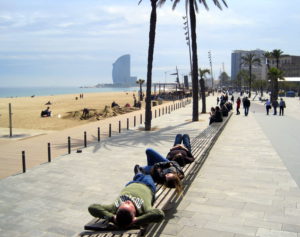Are you an explorer, keen to see the world? Are you considering moving abroad because you were sent there on an expat assignment, or are you of a global mindset and perspective? There are various different kinds of internationally minded people trotting the globe. Here are five examples of a few you may run into in Barcelona.
Table of Contents
The Explorer



While abroad, the explorer actively seeks out experiences with the local culture. They attempt to speak the local language, and are sometimes not always successful, but at least they tried, right? Explorers are sometimes classified as nomads, roaming the globe because there is so much to see, learn, and experience.
There are various types of explorers too.
There are explorers with a specific interest in a particular country, culture or even region. They are known as country-/culturephiles. Take for example the Anglophile. A term given to self-made expats that often fall into this sub-category. Their travel kick is spurred on by their love for a particular destination, thus their move abroad.
The Escapee
Contrary to the explorer, the escapee is less driven by a love for the unknown, and more by a desire to flee their home. Reasons for the escapee’s flight may vary. It could spawn from simply boredom to trouble with an ex-partner or the law. The common theme is typically the further away and more exotic the destination, the better. Perhaps we’ve all wanted to be an escapee once or twice in our lives.
On a more traditional note, the expat retiree is a common example for the escapee type. Being that they are finally able to enjoy the fruits of their long labors, most retirees seek out sunny shores to escape the wet and cold climates of their home countries. Spain and Thailand are popular destinations for the pensioned escapee.
The Foreign Partner
The foreign partner is living abroad not because of a love or hate for one country, but simply because of love, period. Regardless of whether they have met the love of their life during an explorer’s adventure, or simply at the supermarket checkout, the foreign partner finds themselves abroad because love knows no borders. You might be surprised to know that there’s a growing trend amongst expats that are moving for love. At once I thought it was predominantly because of work, but not in many cases.
Depending on their general disposition and personality, moving abroad for love may be the happy fulfillment of a lifelong dream or have the potential of becoming a nightmare. Only the end of the honeymoon phase will tell.
The International Local
The international local is nevertheless very much a global mind. They actively seek out travelers and foreigners, or are at least glad to be in touch with and are thankful for opportunities to share their local expertise with strangers.
International locals are often returned explorers or repatriates themselves, hungering for familiar accents and opportunities to speak the language, keen on sharing experiences, news and stories about the former host country, or simply hoping to get back this feeling of traveling and experiencing foreign cultures.
Related articles: See Barcelona from a different perspective
The Classic Expatriate
These types were usually sent abroad for a few years by their employer. The classic expatriate typically takes the chance to further their career and understandably get a few expat benefits out of their stay abroad. Being sent abroad is, however, already where most similarities between classic expatriates end. Based on their individual characters and their behavior while living abroad, there are at least three very distinct subcategories of classic expatriates: the alien, the elitist, and the assimilator.
The alien sticks out in their host country and culture like a sore thumb, whether by choice (e.g. culturally insensitive behavior), or by circumstances (e.g. outward appearance). The elitist similarly does not integrate in the local culture, but spends most of their time, both at work and at home, with fellow expats. The assimilator, on the other hand, does their best to blend in by speaking the local language and adhering to local customs.



Whatever it may be, there are various types of global minds. As the world evolves into a global village, and we are met with the sometimes awkward task of connecting with our global “family,” these are just a few basic categories on recognizing where we may fit within our global community.





















Leave a Comment